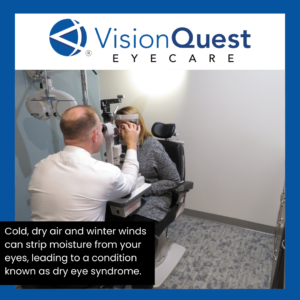As temperatures drop and winter approaches, it’s common to bundle up to protect your body from the cold. However, many people overlook the fact that cold weather can also affect their eyes and vision. At VisionQuest Eyecare, we’re committed to ensuring you have the knowledge and resources to maintain optimal eye health year-round, including during Indiana’s chilly winter months. Here’s how cold weather can impact your vision and what you can do to keep your eyes healthy this season.
How Does Cold Weather Affect Your Eyes?
1. Dry Eyes
Cold, dry air and winter winds can strip moisture from your eyes, leading to a condition known as dry eye syndrome. When the air lacks humidity, your tears evaporate more quickly, leaving your eyes feeling dry, irritated, or gritty. This is especially problematic for those who already struggle with dry eye, but even individuals with no prior issues may notice increased discomfort during winter.
To combat dry eye in winter, use a humidifier indoors to maintain moisture in the air. Over-the-counter lubricating eye drops or prescription treatments from VisionQuest Eyecare can also provide relief. Consider scheduling a consultation if dry eye symptoms persist.
2. Blurred Vision from Cold Wind
Exposure to cold, biting winds can irritate the surface of your eyes, leading to temporary blurred vision. This often occurs because the corneal surface becomes disrupted or inflamed, which can interfere with how your eyes focus light.
Wear wraparound sunglasses or goggles when spending extended time outdoors. These create a protective barrier against wind and cold, reducing the risk of irritation.
3. Increased Risk of Photokeratitis
During winter, the sun’s rays can reflect off snow and ice, amplifying the amount of UV light your eyes absorb. This can cause photokeratitis, a painful condition similar to sunburn, but it affects the cornea. Even on overcast days, UV rays penetrate the clouds, posing a risk to your eyes.
Wear sunglasses with 100% UV protection year-round, especially when outdoors in snowy or icy conditions. Polarized lenses can further reduce glare and protect your vision. At VisionQuest Eyecare, we offer a variety of protective eyewear options to suit your needs.
4. Watery Eyes
For some, cold weather causes their eyes to overproduce tears, a condition known as epiphora. This occurs as a reflex to counteract dryness or irritation from cold winds, leading to excessive tearing.
While watery eyes often resolve on their own, you can protect your eyes by wearing glasses or sunglasses outdoors. If excessive tearing becomes chronic or disrupts your daily activities, our team at VisionQuest Eyecare can evaluate and recommend effective treatments.
5. Foggy Glasses
If you wear glasses, you’ve likely experienced foggy lenses when moving between cold outdoor temperatures and warm indoor environments. This happens due to condensation, which can obscure your vision and cause frustration.
Invest in anti-fog coatings for your glasses or use an anti-fog spray. Our optical team at VisionQuest Eyecare can help you select the right coatings for your lenses to prevent fogging.
6. Worsened Symptoms of Eye Conditions
Winter weather can exacerbate symptoms of existing eye conditions like glaucoma or age-related macular degeneration (AMD). For instance, cold temperatures can impact blood flow, potentially affecting conditions influenced by circulation. Additionally, prolonged exposure to dry indoor air can irritate eyes already compromised by chronic conditions.
Routine eye exams are essential to monitor and manage these conditions, particularly in winter. VisionQuest Eyecare provides comprehensive care to ensure your eyes remain healthy, regardless of the season.
Tips for Protecting Your Vision During Winter
- Stay Hydrated: Proper hydration helps maintain tear production and prevents dry eyes. Drink plenty of water, even when it’s cold outside.
- Limit Screen Time: Increased time indoors often means more time in front of screens, which can worsen dry eye symptoms. Follow the 20-20-20 rule: every 20 minutes, look at something 20 feet away for at least 20 seconds.
- Blink Frequently: Cold weather and indoor heating can lead to infrequent blinking, contributing to dry eye symptoms. Make a conscious effort to blink more often.
- Use Artificial Tears: Lubricating drops can alleviate dryness and discomfort. Choose preservative-free options for frequent use.
- Schedule Regular Eye Exams: Winter is an excellent time to check your eye health and update your prescription. VisionQuest Eyecare offers comprehensive exams in Greenwood and Fishers, ensuring your eyes are protected year-round.
When to See an Eye Doctor
While many cold weather-related eye issues are temporary or manageable with lifestyle adjustments, some symptoms may require professional attention. Contact VisionQuest Eyecare if you experience:
- Persistent dryness, redness, or irritation
- Significant changes in vision
- Excessive tearing or discharge
- Pain or sensitivity to light
Our expert team can diagnose and treat underlying issues, helping you enjoy clear, comfortable vision even during the coldest months.
Winter Vision Care at VisionQuest Eyecare
At VisionQuest Eyecare, we’re here to help you maintain optimal eye health, no matter the season. From treating dry eye syndrome to offering protective eyewear and managing chronic conditions, our services are designed to meet your unique needs. With locations in Greenwood and Fishers, Indiana, we make it easy to access top-quality care close to home.
Don’t let winter weather compromise your vision. Schedule an appointment today to ensure your eyes stay healthy and comfortable all season long. Visit our website at VisionQuest Eyecare or call to book your appointment.
Stay warm, stay safe, and see clearly!

Dr. Collin Rush is passionate about bringing clear eyesight and better eye health to the community. Having graduated in the top 1% of his class at Indiana University School of Optometry, Dr. Rush primarily focuses on dry eye and keratoconus but is also trained in laser therapies for glaucoma and secondary cataracts.



